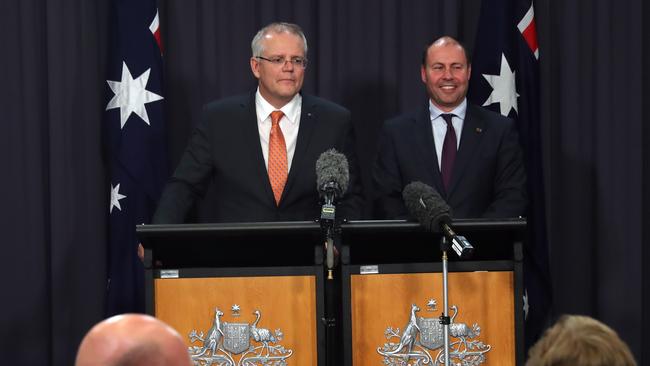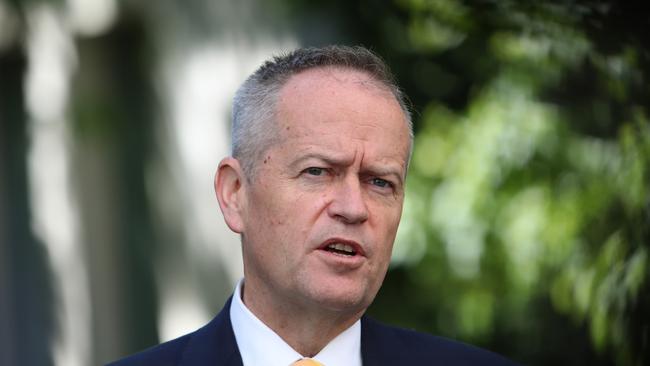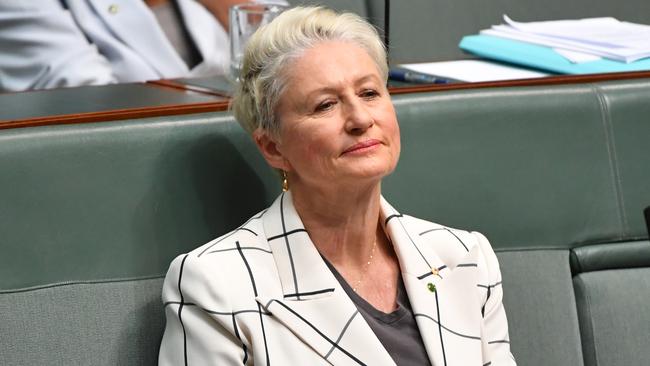Why we should expect a March 2 election
Careful watchers would have seen the clues that Federal Parliament may not come back, writes Dennis Atkins. Don’t be surprised if Scott Morrison returns to call an early election.
Rendezview
Don't miss out on the headlines from Rendezview. Followed categories will be added to My News.
If you think you knew what was going on in national politics this past week, you were watching a different channel.
It was a madcap, embarrassing, unedifying, bitter, too-smart-by-half, ego-driven, game-playing, pointscoring and moral ground-occupying week that left no one with any real credit.
The week, the last one in which our national Parliament sat, also gave us the best window yet into how the next election will be fought.
We saw the Coalition and Labor scoping out their preferred territory and testing lines and themes.
MORE FROM DENNIS ATKINS: Libs’ latest move won’t fix their woes
We also saw the tenor and volume of the rhetoric and got a measure of just how far and how loud the principals — Scott Morrison and Bill Shorten — will take things.
The traditional arc of politics in Australia has been that the Coalition has a head start on the economy and national security while Labor is the caring side which can be depended on to provide schools, health care, welfare, wage justice and a general social safety net.
Nothing this week changed that too much, although the advantage the Coalition has on the economy is on shakier ground than it has been.
While the economic indicators look quite strong — growth is better than most of our trading partners, unemployment is steady and trending down, inflation is in check and interest rates are at historically low levels — there is a nagging feeling among voters that things are not headed in the right direction and the cost of living is often too much to bear.

This is because we have had negative or flatlining wage growth for seven years, starting in 2010-11 after the great global recession and, according to recent Reserve Bank forecasts, it will continue until at least 2020.
Even this forecast must be seen as optimistic. Every prediction of the wage-price index over the past seven years has been pitched way over the eventual outcome, between 1 and 2 per cent.
The national accounts released this past week continued to track this wage stagnation and also found our saving ratio was shrinking — suggesting people are dipping into their bank accounts and other asset sources to get by.
Housing costs are still high as are electricity costs, putting most average families behind the eight-ball week in, week out.
The softening of the Australian economy, which was found in just about all parts of this week’s national accounts, and the persistently flat wages growth, will make it hard for Morrison and his Treasurer Josh Frydenberg to push a robust message on economic management.
This is especially so because polls have recently shown the gap on economic management narrowing between Labor and the Coalition, and the ALP commanding a dominant lead on providing wage growth and helping with the cost of living.

Attention then turns to national security and the twin subsets of dealing with asylum seekers and fighting terrorism.
Both of these were at the centre of two legislative battles this week — one kickstarted by the recently emboldened and enhanced House crossbench, and the other coming up from the intelligence and law enforcement authorities.
The amendments to interception laws do three things with particular emphasis on encrypted communications. The laws provide new rules on what communications and technology companies have to do to assist law enforcement, allow new warrants to allow agencies to seize information straight from a device and lets agencies access more data through existing warrants.
MORE FROM DENNIS ATKINS: The radical Right has trashed the Liberal Party
By any measure, this is one of the biggest changes we’ve seen to national security laws.
On the asylum seeker front, new independent Kerryn Phelps and Labor, in concert with the Greens, have sought to get the 12 children remaining on Nauru back to Australia for medical and psychiatric assessment and assistance for at least some of the 190 adults remaining at the detention centre or in the local community. (There are a further 1000 adults males held or living on Manus Island in Papua New Guinea.)
By the end of a week which included suicidal political overreach by Malcolm Turnbull, more gender wars in the Senate, a snippy fight over discrimination in schools, a switch by Morrison to protect future Liberal prime ministers from midterm challenges, we had a win for the government on encryption and a stand off on asylum seekers.

The national security laws were so complicated they doubtless passed the attention of most people, particularly as the Coalition and Labor finished in compromised agreement.
On asylum seekers, Morrison and the Coalition got at least a toe hold in the battle with Labor but it’s where people’s attention is next year that will matter. This remains Labor’s one serious soft spot.
MORE FROM DENNIS ATKINS: Labor is a dead cert at the next federal election
The week hasn’t changed too much but the Coalition has dealt with one issue likely to give it trouble — would a Liberal prime minister stay in the job for the whole term? — and begun to get a line on its one great hope in chipping away at Labor’s poll lead, asylum seekers.
Labor has maintained its steady as it goes approach with Shorten showing more authority and certainty in his communication skills.
While the Government has laid out a map for an April 2 Budget and a probable poll on May 11, there are signs the Parliament will not come back.
Coalition staffers left Canberra on Thursday night looking like they had cleaned out their apartments, going home for a long haul to an election.
Don’t be surprised if Morrison comes back to work just before Australia Day and calls an election for March 2.
Dennis Atkins is national affairs editor for The Courier-Mail.
@dwabriz
Don’t miss Dennis Atkins and Malcolm Farr’s politics podcast Two Grumpy Hacks, available for free on iTunes or Soundcloud.


